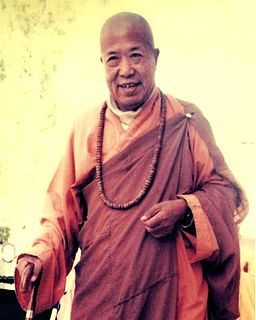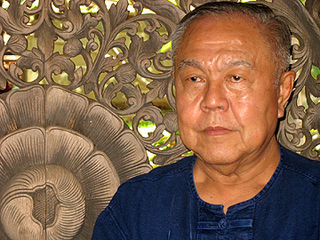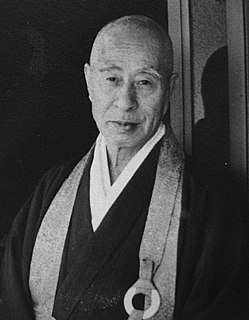Top 1127 Zen Buddhism Quotes & Sayings - Page 2
Explore popular Zen Buddhism quotes.
Last updated on November 21, 2024.
Well, I would have to say as a Christian that I believe any belief system, any world view, whether its Zen Buddhism or Hinduism or dialectical materialism for that matter, Marxism, that keeps persons captive and keeps them from coming to faith in the Lord Jesus Christ, yes, is a demonstration of satanic power.
I began researching and writing what I intended as a book-length essay entitled Fascination and Liberation, exploring the question of whether there is a conflict between creativity and the Eastern form of enlightenment. I don't know if I'll ever finish that essay, because I had an experience, after I'd written two or three chapters, in which it seemed to me that my psychic antibodies decisively rejected Buddhism. Interestingly, the rejection felt as if it happened in Zen terms.
Zen abhors repetition or imitation of any kind, for it kills. For the same reason Zen never explains, but only affirms. Life is fact and no explanation is necessary or pertinent. To explain is to apologize, and why should we apologize for living? To live—is that not enough? Let us then live, let us affirm! Herein lies Zen in all its purity and in all its nudity as well.
A handful of men working within the Zen sect of Buddhism created gardens in fifteenth-century Japan which were, and still are, far more than merely an aesthetic expression. And what is left of the earlier Mogul gardens in India suggests that their makers were acquainted with what lay behind the flowering of the Sufi movement in High Asia and so sought to add further dimensions to their garden scenes.
I have my own way to walk and for some reason or other Zen is right in the middle of it wherever I go. So there it is, with all its beautiful purposelessness, and it has become very familiar to me though I do not know "what it is." Or even if it is an "it." Not to be foolish and multiply words, I'll say simply that it seems to me that Zen is the very atmosphere of the Gospels, and the Gospels are bursting with it. It is the proper climate for any monk, no matter what kind of monk he may be. If I could not breathe Zen I would probably die of spiritual asphyxiation.
To have Zen is to be in a state of pure sensation. It is to be freed from the grip of concepts, to see through them. This is not the same as rejecting conceptual thinking. Thoughts and words are in the world and are as natural as flowers. It is a mistake therefore to think that Zen is anti-intellectual.
Why can't we simply borrow what is useful to us from Buddhism, Hinduism, Taoism, especially Zen, as we borrow from Christianity, science, American Indian traditions and world literature in general, including philosophy, and let the rest go hang? Borrow what we need but rely principally upon our own senses, common sense and daily living experience.
I make a distinction between Buddhism with a Capital 'B' and buddhism with a small 'b'. Sri Lanka has the former, in which the state uses Buddhism as an instrument of power, so there are even Buddhists monks who say the Tamils should be eliminated. Thai Buddhists are not perfect either. Some Thai Buddhist monks have compromised with the kind and possess cars and other luxuries. In many Buddhist countries, the emphasis is on being goody-goody, which is not good enough. I am for buddhism with a small 'b' which is non-violent, practical and aims to eliminate the cause of suffering.
The basic idea of Zen is to come in touch with the inner workings of our being, and to do this in the most direct way possible, without resorting to anything external or superadded. Therefore, anything that has the semblance of an external authority is rejected by Zen. Absolute faith is placed in a man's own inner being. For whatever authority there is in Zen, all comes from within.
The question has often been asked; Is Buddhism a religion or a philosophy? It does not matter what you call it. Buddhism remains what it is whatever label you may put on it. The label is immaterial. Even the label 'Buddhism' which we give to the teachings of the Buddha is of little importance. The name one gives is inessential.... In the same way Truth needs no label: it is neither Buddhist, Christian, Hindu nor Moslem. It is not the monopoly of anybody. Sectarian labels are a hindrance to the independent understanding of Truth, and they produce harmful prejudices in men's minds.
Failing at something is one thing, but Buddhism tells us that it is up to us how we interpret that failure [Buddhism] a philosophy and way of life that resonates with me I identify with it. I agree with so much of the sentiment behind it. I enjoy the liberating effect it's had on me to get back into the game Buddhism, with its concepts of karma and rebirth, have freed me from the twin fears of death and life without rugby, like life, will also come to an end.
So the most difficult thing is always to keep your beginner's mind. There is no need to have a deep understanding of Zen. Even though you read much Zen literature, you must read each sentence with a fresh mind. You should not say, "I know what Zen is," or "I have attained enlightenment." This is also the real secret of the arts: always be a beginner. Be very very careful about this point. If you start to practice zazen, you will begin to appreciate your beginner's mind. It is the secret of Zen practice.
If you are thinking, you can't understand Zen. Anything that can be written in a book, anything that can be said - all this is thinking . . . but if you read with a mind that has cut off all thinking, then Zen books, sutras and Bibles are all the truth. So is the barking of a dog or the crowing of a rooster. All things are teaching you at every moment, and these sounds are even better teaching than Zen books.





































